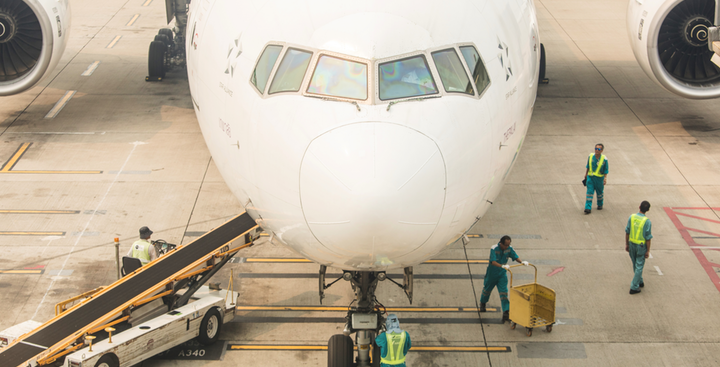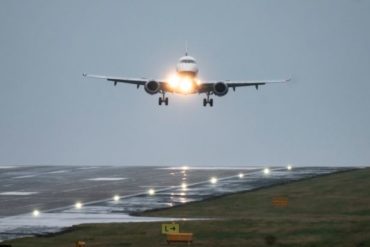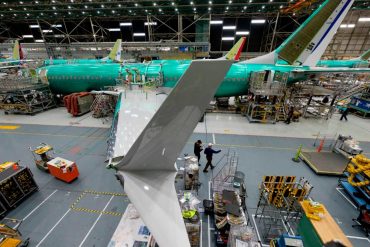31 January 2020 | 4:19 am
Safer sky is always going to be hard-won. But it didn’t have to cost the airlines so much to sustain. WOLE OYEBADE writes.
Even by the global standards, the last four years have a milestone for local aviation. In an industry where very seconds counts, for one to have gone on over 1460 days without a fatal accident is a significant achievement.
Indeed, the record could have gone unsung by the flying public. Not for pilots, crew, air traffic controllers, operators, regulators and other stakeholders who daily have their hands on the control, knowing that indecision or a bad one could just be final and fatal.
Coming from the harrowing days of multiple crashes of the 2000 era, and a tedious bounce back through the high-risk business environment, the stakeholders would relish the safety feat as landmark.
Though there is no amount too much to achieve aviation critical safety in modern travel business, sustaining the records on a bounce now impresses the needs for local maintenance facility for operating aircraft, aircraft leasing company and other supportive measures for the industry.
Back in the days
The turn of this century was a watershed for in the history of local commercial aviation and its safety. In the first decade, airplanes were literally falling off the sky and taking scores of air passengers with them. Some of the crashes were quite unforgettable.
EAS airlines’ BAC One-Eleven plane conveying 149 persons crashed in 2002 in Kano killing all onboard. In 2005, Bellview’s B737 plane crashed on the outskirt of Lagos killing 117 persons. About two months later, Sosoliso plane crash landed at the Port Harcourt International Airport (PHIA), killing 108 passengers.
Year 2006 was not better, as ADC Boeing737 plane crashed just after takeoff in Abuja, killing 97 persons. In 2012, Dana Airline’s MD 83 plane crashed in Lagos killing 153 passenger and six victims on the ground. Unaccounted were series of fatal chopper and helicopter crashes that continued until 2016. However, a lot has since changed since then.
The apex regulatory body saddled with safety regulations and its enforcement, Nigerian Civil Aviation Authority (NCAA), said the new era in safety was the combined efforts of the overseeing Ministry of Aviation, the regulators, operators and the service providers.
Most important was the common will to learn from the past crashes through the implementation of findings and safety recommendations by investigators at the Accident Investigation Bureau (AIB).
AIB Nigeria was set up as an independent agency in 2007. To date, it has released 45 final reports, five safety bulletins and 174 safety recommendations with 85 per cent implementation rate.
Lower risks, safer skies
Another measure that turned the tide is international certification and compliance to standards. As at today, about half of the operating local airlines are on the International Air Transport Association’s Operational Safety Audit (IOSA) registry, which connotes international safety standards.
IATA, the clearing house for 285 airlines worldwide, recently ranked Air Peace highly in terms of compliance to safety standard and procedures.
The airline, though marked its fifth anniversary recently, is the largest commercial airline and account for about 40 per cent of the market share.
The Head of Account Management, IATA West and Central Africa, Dr. Samson Fatokun, at the presentation of IOSA certificate to Air Peace airlines, commended the carrier for upholding high standards of safety in its flight operations.
Fatokun especially congratulated the Air Peace team for achieving the rare feat, which many airlines often failed to complete given its rigorously detailed processes.
He said: “Scaling through this third safety audit process is a testament to Air Peace’s commitment to maintaining high safety standards in its operations.
“Safety is IATA’s number one priority, and for any airline to pass the safety audit, its safety compliance must be 100 per cent, and Air Peace has met this prerequisite.
“Many airlines are not able to achieve this because they don’t have the discipline and hard work which have consistently earned Air Peace this safety recognition. The certificate gives the airline a global recognition as a 100 per cent safety-compliant airline,” Fatokun said.
IOSA is an internationally recognised and accepted evaluation system designed to assess the operational management and control systems of an airline.
A regular flyer and aviation enthusiast, Niran Ojemakinde, said it was great seeing the local airlines make progress and doing Nigeria proud on many fronts.
“It is important to commend these airlines, especially Air Peace. Things are not all perfect yet, but today, we can afford to put the whole family on an aircraft and not have to worry. In the 2000 period, you dare not try it. Even to board as a regular, you must have said some prayers.
“In fairness, the airlines deserve our commendation and support because we are fast getting to world standard. I feel safer flying today,” Ojemakinde said.
Cost of safety
Indeed, the erstwhile reckless nature of aircraft utilisation also gave way to routine maintenance checks in accordance to the rule book. For instance, a commercial jet requires C-check every 18 months. It requires the inspection of most of the aircraft’s components and some replaced in a maintenance programme lasting an average of two weeks. D-check is the complete overhaul of an aircraft that may be done every six years.
Average cost of a C-check overseas is $2million (N612 million) or more depending on number of components that need replacement during the repair exercise. This, therefore, explains why aircraft maintenance alone cost about 30 per cent of operating cost of most airlines.
The Chairman of Air Peace, Allen Onyema, said a total of nine C-checks were done in 2019 to keep the fleet up to date on safety, though at huge fortune.
Meanwhile, it would have cost the airlines lesser, save the country foreign exchange and create new jobs if Nigeria has sufficient maintenance facility locally. Currently, only Aero Contractors has a functional Aircraft Maintenance Organisation (AMO) to cater for bourgeoning need.
He said: “I want us to support Aero Contractors in whatever they are doing. Aero is doing very well with its MRO. We had nine C-checks on our aircraft in 2019, which means that two years earlier, we bought nine airplanes. In the past year, we spent billions of naira on aircraft maintenance.
“We are giving Aero Contractors jobs and they are doing them well. We are looking forward to the day they will commence D-checks on aircraft. Let’s start supporting each other. That is the only way we can grow as industry.
“Airline business does not make anyone richer, but I know I’m richer because of the over 3,000 people I employed. If you pull one person out of the street, you are reducing criminalities in our society,” he said.
The Chief Operating Officer (COO), Toyin Olajide, added that the huge investment and time spent were part of the airline’s resolve to sustain the best safety standards as the airline continues on seamless connectivity and an expanded route network in 2020.
On a larger scale
Arguably, air travel has been safer in terms of aggregate crashes and fatalities globally. Despite the high-profile Boeing 737 Max accident, the year 2019 was one of the safest years ever for commercial aviation, Aviation Safety Network data show.
Yet, while the number of fatalities has decreased, the number of accidents has increased to a level above the five-year average.
Over the year 2019, the Aviation Safety Network recorded a total of 20 fatal airliner accidents, resulting in 283 occupant fatalities. This makes 2019 the seventh safest year ever by the number of fatal accidents and the third safest in terms of fatalities.
The safest year in aviation history was 2017 with 10 accidents and 44 lives lost. Looking at that five-year average of 14 accidents and 480 fatalities, last year showed a markedly higher number of accidents.
General Manager, Public Affairs at the NCAA, Sam Adurogboye, said it was, therefore, remarkable that the local sector has continued to keep the sky safer and retained category one status through collaboration of all stakeholders.
Sustaining the thrust
Adurogboye commended the operators for their willingness to comply with safety regulations, which has largely led to safer operations.
“As safety regulator we will keep at regular audit, ramp inspection, surveillance and enforcement. We will have to strength on compliance because that is very key. Training of our inspectors and motivation is key priority. About 70 per cent of our budget already goes to training, to continue to do the right thing.
“The greatest challenge is that we are a safety category one nation and we have to continue to work harder to sustain it. Many countries have lost it but Nigeria continues to retain its own because we keep working. We will keep encouraging the airlines to be part of IATA because it cost money to be audited and certified. We are in the premier league of countries with safest sky and we will remain there,” Adurogboye said.
A travel agent, Hassan Yinusa, said the airlines, especially, should be encouraged to sustain the safety record and the general public should support them in the process.
“We all can do that by patronising our own. They have shown that they are of the world standard with IATA audit and certification. On both regional and international routes, let us fly them to help them grow stronger. Air Peace is doing very well, so is Arik, Max and Dana. The government too should support and protect them. You cannot be wrong support your own.”




